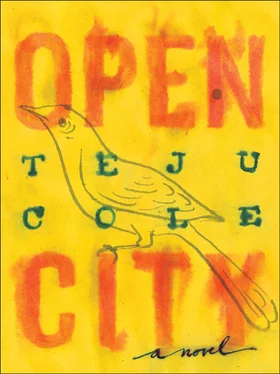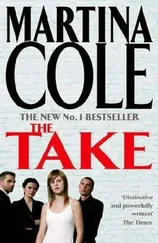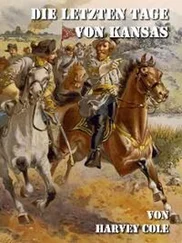I stepped out onto the terrace, which I had been wanting to do all evening: the view was a marvel, as Moji had promised. It wrapped around the apartment on two sides and, from up there on the twenty-ninth floor, I could take in, in a single glance, the dwellings of millions. The way the tiny lights winked across the miles of air made me think of all the computers in all those homes, most of them sleeping now, with their single lights silently toggling between on and off. I was on my third glass of champagne. The day felt far away, and my spirit was soothed. There was, too, the pleasant sensation of flirting with Moji, not with any expectation, but for the pleasure of it. And I noticed, this time, less tension, less conflict, in my interaction with her. I was glad I had come.
The glass door clicked open behind me, and John came out onto the balcony. He also had a full champagne glass in his hand. His cheeks were flushed with drink. I complimented him on his generosity, and on his beautiful apartment. There was a row of bonsai trees, maybe a dozen plants in all, along the plate-glass window in the living room. They could not have been more different from ordinary houseplants. Each bonsai tree, stocky, ancient, and gnarled, had been growing since before we were born, and each had within its trunk and roots the genetic secrets that would ensure that it would outlive us all. I had been admiring them earlier, I told him. He asked me if I had noticed the one tagged Acer palmatum . That little baby is a hundred and forty-five years old, he said. Some call it the Japanese maple, and it can grow, I don’t know, seventy feet, eighty feet. But this game is not about size now, is it? Did you notice how its leaves are like those of the marijuana plant? He chuckled. I was put off, but even he couldn’t spoil my mood.
AFTER I LEFT JOHN’S PLACE, I STOPPED BY A DINER AT 181ST AND Cabrini for a coffee. I drank it quickly, then walked farther down Cabrini to 179th, and negotiated my way around to the George Washington Bridge. I wanted to see, closer at hand, the sun rising over the Hudson. The city was still asleep. In the diner, I had seen one man with a tattoo that covered most of his arm resting his head on his knuckles. When I came out, I saw another man, Dominican or Puerto Rican, in a parked car, who was either asleep or staring blankly at the GPS device in front of him. The reflection of the sun turned half of the windshield into a bright metallic field. When I got on the pedestrian walkway on the Fort Lee — bound side of the bridge, I saw, ahead of me and on the other side of the median, a stalled, maroon-colored car. It was one of the large American models from the late eighties, possibly a Lincoln Town Car, and it had plowed into a guardrail. The accident must have happened not more than fifteen or twenty minutes before I got there; the fire truck and police cars were just arriving. They pulled up in silence, clustering along the length of the bridge; there was almost no traffic, and they hadn’t needed their sirens. I could see that both of the car’s front doors were open, and that the windows had been smashed. The front end of the car was crumpled, and there was glass on the road, and blood as well, pooled on the pavement like an oil leak. I walked a few yards more, and could now see the car from the east.
On the concrete ledge near the car, with the rising sun gliding up the sky behind them, sat a couple. They were silent, bewildered, taking in the bad dream of a Saturday morning. From the distance, they looked Filipino, or perhaps Central American. As I walked onto the overpass, the firemen had just reached them, all business. The bright red of the fire truck was like a gash across the empty road. Where could all the blood near the car have come from? The man and woman both had leg injuries but didn’t seem to be bleeding profusely. It was surreal, as surreal, in my memory of it now, as anything I had ever seen. This vision of needless suffering colored what else I saw of the sunrise, the river, and the quiet morning roads in the hour that followed, when, coming down from the bridge, I walked down Fort Washington until it met 168th Street, at the medical campus, and from there walked on Broadway, through the littered, sleeping barrio, all the way down, through Harlem, then on to Amsterdam and Columbia University’s quiet campus. I saw my neighbor Seth — it had been months, I don’t think I had seen him once since he’d told me of his wife’s death — and I stopped to greet him. He was, with the building superintendent’s assistance, dragging the second of two large mattresses out to the front of the building. Have to buy new ones, he said. He appeared to be reading something on the surface of the mattress, which had been propped up against the front of the building. Then he turned around and, by way of explanation, said, These ones have been invaded by bedbugs.
Seth asked if I had seen any sign of them in my own apartment, and I said I hadn’t. But then I remembered that, before he left about two weeks earlier, my friend had mentioned trying to rid his place of them. His tenure application at Columbia had been unsuccessful, and he had left New York, bedbugs and all, for a teaching position at the University of Chicago. Much to my surprise, the new girlfriend, Lise-Anne, had gone with him. And it was at that particular moment, speaking with Seth in the front of the infected mattresses, that I had an inkling of how acutely I would feel the absence of my friend.
EACH PERSON MUST, ON SOME LEVEL, TAKE HIMSELF AS THE CALIBRATION point for normalcy, must assume that the room of his own mind is not, cannot be, entirely opaque to him. Perhaps this is what we mean by sanity: that, whatever our self-admitted eccentricities might be, we are not the villains of our own stories. In fact, it is quite the contrary: we play, and only play, the hero, and in the swirl of other people’s stories, insofar as those stories concern us at all, we are never less than heroic. Who, in the age of television, hasn’t stood in front of a mirror and imagined his life as a show that is already perhaps being watched by multitudes? Who has not, with this consideration in mind, brought something performative into his everyday life? We have the ability to do both good and evil, and more often than not, we choose the good. When we don’t, neither we nor our imagined audience is troubled, because we are able to articulate ourselves to ourselves, and because we have, through our other decisions, merited their sympathy. They are ready to believe the best about us, and not without good reason. From my point of view, thinking about the story of my life, even without claiming any especially heightend sense of ethics, I am satisfied that I have hewed close to the good.
And so, what does it mean when, in someone else’s version, I am the villain? I am only too familiar with bad stories — badly imagined, or badly told — because I hear them frequently from patients. I know the tells of those who blame others, those who are unable to see that they themselves, and not the others, are the common thread in all their bad relationships. There are characteristic tics that reveal the essential falsehood of such narratives. But what Moji had said to me that morning, before I left John’s place, and gone up on the George Washington Bridge, and walked the few miles back home, had nothing in common with such stories. She had said it as if, with all of her being, she were certain of its accuracy.
Of the ten or so people who had stayed over at the apartment on the night of the party, I had risen earliest. It was around six, and the sun was up already. I tiptoed over the slumbering bodies on the floor of the living room, and went into the kitchen. I made some tea, and tiptoed back, and sat on the glassed-in terrace, overlooking the Hudson. Moji came to join me, sitting in the other low, padded chair.
Читать дальше












